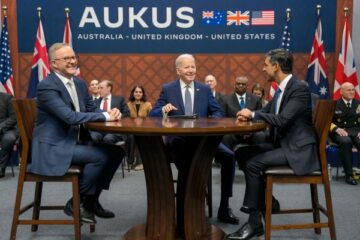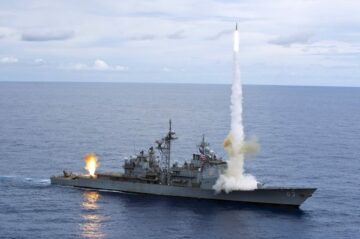
Late last week, Thailand’s defense establishment announced that it would postpone a troubled Chinese submarine deal and purchase a Chinese-built frigate in its place, after years of negotiations over the politically important procurement.
During a visit to the Royal Thai Navy (RTN)’s headquarters on Friday, Thailand’s Defense Minister Sutin Klungsang told reporters that the RTN would order a Chinese frigate instead of a Chinese submarine, due to protracted disagreements over the boat’s propulsion system.
Sutin said that the frigate in question – probably the Type 054A – had defensive capabilities in the air, surface and underwater, and would be a suitable addition to the RTN’s surface fleet. He hastened to add that the submarine purchase had been suspended rather than canceled. “The submarine project is not scrapped but will be shelved for a certain period,” he said, according to the Bangkok Post. “It will resume when the country is ready.”
In 2017, Thailand’s cabinet approved the purchase of a Yuan-class submarine for 13.5 billion baht ($369 million), with delivery expected this year. But the purchase ran into trouble when the Chinese state-owned submarine developer was unable to buy a German-built diesel engine for the sub, due to a European Union arms embargo imposed on Beijing.
Several rounds of negotiations ensued, in which the Chinese side sought to convince the RTN to accept a Chinese-made prototype CHD620 propulsion system, which it said would be functionally equivalent to the cutting-edge MTU396 diesel engines manufactured by Germany’s Motor and Turbine Union company.
In April, Navy Chief Adm. Choengchai Chomchoengpaet said that the Thai government was willing to accept the alternative CHD620 propulsion system, provided that it is safe, and that China compensates Thailand for the delay in the delivery of the boat. But the new government headed by Prime Minister Srettha Thavisin appears to have backed away from this decision, insisting that the China Shipbuilding & Offshore International Co. honor the original contract.
As an alternative, the Bangkok Post reported, the navy came up with two proposals: either to buy a frigate capable of anti-submarine operations, or to purchase an offshore patrol vessel. Defense Minister Sutin said that he and the government opted for the former, which would cost 17 billion baht – 3.5 billion more than the submarine project.
“The frigate option will compromise the navy’s capability slightly when compared with a submarine project but the navy can accept it,” Sutin said.
The Thai government has previously threatened to pull out of the deal if a suitable solution cannot be found, something that would likely impact negatively on its relationship with China. The frigate solution would appear to resolve this dilemma, satisfying the RTN’s operational needs and keeping relations with Beijing on an even keel.
A frigate might actually end up being more useful for Thailand. The RTN has long harbored ambitions to acquire a submarine fleet, but many observers have questioned the practicality of such a plan, given the shallowness of Thailand’s territorial waters. Some have even argued that the ambition stems more from sectional interests within the Thai defense establishment, and a desire to keep pace with other Southeast Asian navies than it does from genuine operational needs.
At the same time, some have criticized the continued lack of transparency surrounding the deal, and how much money the RTN had already invested whether in training personnel and the constructing of a submarine dock to accommodate the Yuan-class boat.
In an editorial published today, the Bangkok Post said that Srettha’s government “deserves credit for trying to solve the controversial submarine procurement – something the preceding government utterly failed to do.” But it criticized the government’s continued lack of transparency, citing an October 19 meeting of a parliamentary committee on military affairs, in which Sutin and the RTN chief of staff were questioned about the procurement. Despite a call by the opposition Move Forward Party for the meeting to be broadcast, the meeting was held in private.
“It is such a pity that the government seems likely to hold this inquiry behind closed doors. It is a deal that encapsulates the culture of secrecy and lack of transparency that underlines armed forces procurements,” the editorial stated. “What society wants is transparent arms procurements and military reform. That means doing more than ditching a submarine in favor of a pricier frigate.”
In any event, given the number of twists and turns this controversial, symbolic, and diplomatically sensitive procurement has taken since 2017, it would be surprising to see the issue rest here.
- SEO Powered Content & PR Distribution. Get Amplified Today.
- PlatoData.Network Vertical Generative Ai. Empower Yourself. Access Here.
- PlatoAiStream. Web3 Intelligence. Knowledge Amplified. Access Here.
- PlatoESG. Carbon, CleanTech, Energy, Environment, Solar, Waste Management. Access Here.
- PlatoHealth. Biotech and Clinical Trials Intelligence. Access Here.
- Source: https://thediplomat.com/2023/10/thailand-will-replace-chinese-sub-with-frigate-defense-minister-says/
- :has
- :is
- :not
- $UP
- 1
- 13
- 17
- 17 billion
- 19
- 2017
- 24
- 9
- a
- About
- Accept
- access
- accommodate
- acquire
- across
- actually
- Ad
- add
- addition
- Affairs
- After
- AIR
- already
- alternative
- ambition
- an
- and
- announced
- any
- appear
- appears
- approved
- April
- argued
- armed
- arms
- article
- asian
- away
- backed
- baht
- Bangkok
- BE
- been
- behind
- Beijing
- being
- Billion
- boat
- broadcast
- but
- buy
- by
- cabinet
- call
- came
- CAN
- canceled
- cannot
- capabilities
- capability
- capable
- certain
- chief
- China
- chinese
- citing
- click
- closed
- CO
- committee
- company
- compared
- compromise
- constructing
- continued
- contract
- controversial
- convince
- Cost
- country
- credit
- Culture
- cutting-edge
- deal
- decision
- Defense
- defensive
- delay
- delivery
- desire
- Despite
- Developer
- developing
- diesel
- do
- Dock
- does
- doing
- doors
- due
- Editorial
- either
- Embargo
- encapsulates
- end
- Engine
- Engines
- Equivalent
- establishment
- Ether (ETH)
- European
- european union
- Even
- Event
- expected
- Failed
- favor
- FLEET
- For
- Forces
- Former
- Forward
- found
- Friday
- from
- full
- functionally
- genuine
- given
- Government
- had
- Have
- he
- headed
- Headquarters
- Held
- here
- hold
- honor
- How
- HTML
- HTTPS
- if
- Impact
- important
- imposed
- in
- inquiry
- instead
- interests
- International
- into
- invested
- issue
- IT
- ITS
- jpg
- Keep
- keeping
- Lack
- Last
- likely
- Long
- manufactured
- many
- means
- meeting
- might
- Military
- million
- minister
- money
- more
- Motor
- move
- move forward
- much
- needs
- negatively
- negotiations
- New
- None
- number
- observers
- october
- of
- on
- operational
- Operations
- opposition
- Option
- or
- order
- original
- Other
- out
- over
- Pace
- Parliamentary
- party
- period
- Personnel
- Place
- plan
- plato
- Plato Data Intelligence
- PlatoData
- politically
- Post
- previously
- Prime
- prime minister
- private
- probably
- procurement
- project
- Proposals
- propulsion
- prototype
- provided
- published
- purchase
- question
- Questioned
- rather
- ready
- reform
- relations
- relationship
- replace
- Reported
- REST
- resume
- rounds
- royal
- safe
- Said
- same
- says
- see
- seems
- sensitive
- side
- since
- Society
- solution
- SOLVE
- some
- something
- sought
- southeast
- Staff
- state-owned
- stated
- stems
- Stories
- Story
- subscribe
- such
- suitable
- Surface
- surprising
- Surrounding
- suspended
- symbolic
- system
- taken
- thai
- Thailand
- Thailand’s
- than
- that
- The
- this
- this year
- time
- to
- today
- Training
- Transparency
- transparent
- trouble
- trying
- turbine
- turns
- twists
- two
- type
- unable
- underwater
- union
- useful
- Vessel
- Visit
- wants
- was
- Watch
- Waters
- week
- were
- when
- whether
- which
- will
- willing
- with
- within
- would
- year
- years
- zephyrnet












